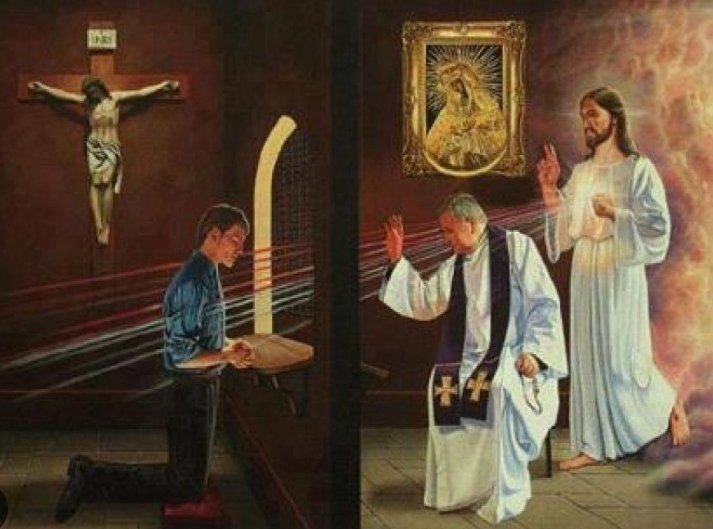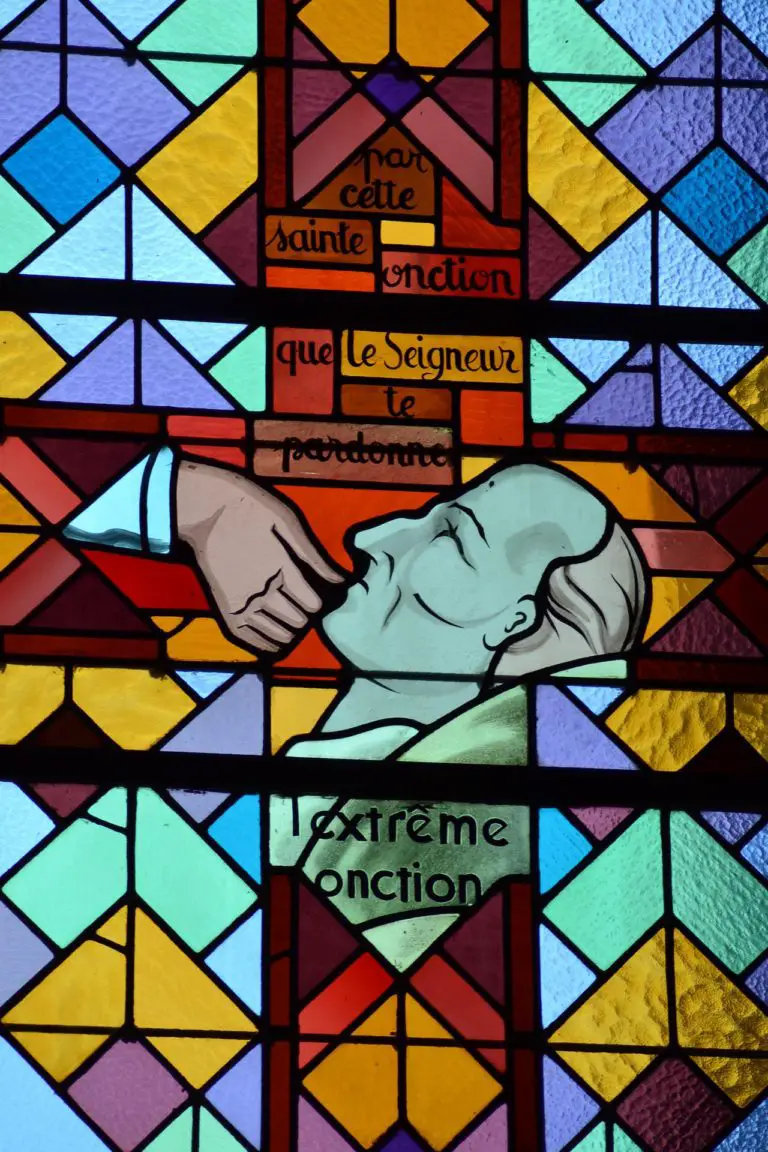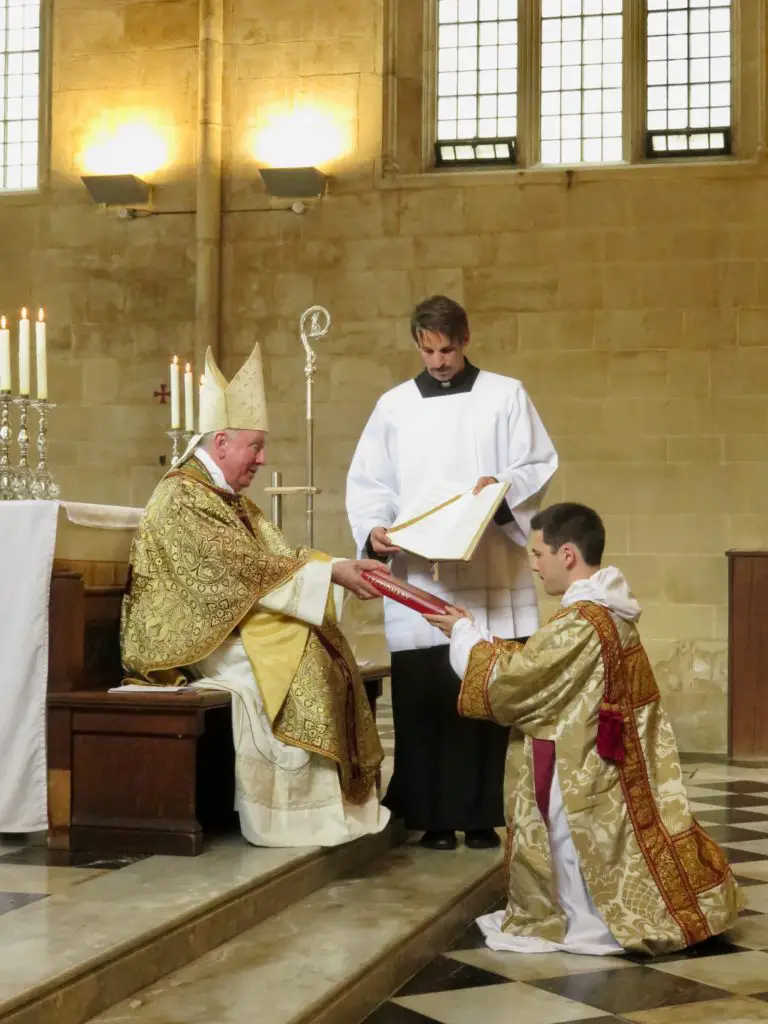What is the Sacrament of Reconciliation?
The Sacrament of Reconciliation often known as confession and/or penance, is the process by which a penitent seeks forgiveness for their wrongdoing called sin.
Arising in the individual’s conscience is the acknowledgement or the admission, after careful reflection, called an Examination of Conscience, of personal sin and/or sin against others, to which the person seeks forgiveness or pardon, through the process of private confession to a priest. The person then is absolved and assigned a penance deemed suitable by the priest as an act of contrition for their sin.
The Sacrament of Reconciliation is a doctrine of the church and provides the individual who seeks it and carries out worthily the admission or confession of their sins to a priest receives an abundance of grace that he or she has hindered. The soul of each individual houses the Holy Spirit along with sanctifying grace where God resides. When an individual commits a mortal [death] sin, God’s grace is removed until the person seeks the sacrament.
It is the process of healing, equated to in the real world, with the sickness that one experiences in their health, they seek healing through a medical practitioner. The same way the person in the Sacrament of Reconciliation seeks to be healed.
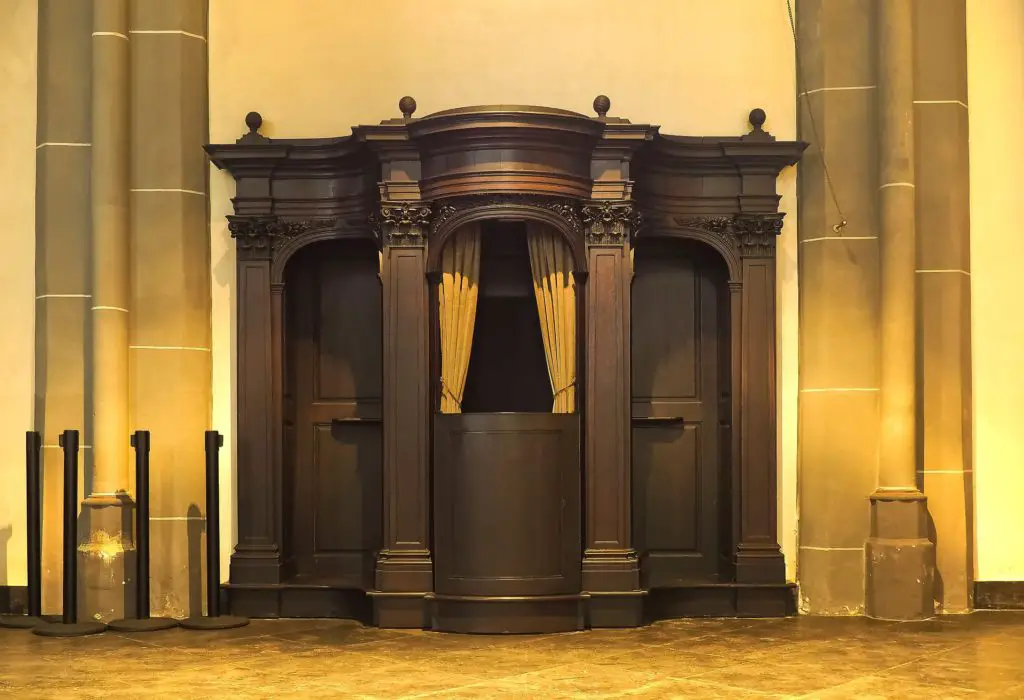
The Sacrament of Reconciliation was instituted through the actions and the words of Jesus Christ and handed to His Apostles, the chosen twelve, to carry out and also to pass on to their successors, and down the line to our current day priests.
Confessing to others is not exclusive to the Catholic Church. Confessing sins to others can be traced to the people of the synagogue in the Old Testament. This is our next headline where we look at where is confession in the Bible?
Where is the Sacrament of Reconciliation or Confession or Penance in the Bible?
The Sacrament of Reconciliation or Confession or Penance is known interchangeably by these three names is that when a person receives the Sacrament, he/she fulfills all three. The Sacrament is a three-step process:
Step One: the penitent seeks to reconcile. They desire to make up with the creator whom they have offended.
Step Two: the penitent confesses the wrongdoing(s) which has led them to create the distance between themselves and God.
Step Three: the penitent receive penance to aid in expressing one’s contrition for the confessed and acknowledged sin.
What does the Bible tell us about this sacrament?
Confession occurs both the Old and New Testaments. Below are several quotes taken from firstly the Old Testament and then followed by the New Testament.
These show that confession was a part of the spiritual and temporal wellbeing of the Jewish and then the Christian communities.
Old Testament references:
Admission or Acknowledgement of sin:
“The person that sweareth, and uttereth with his lips, that he would do either evil or good, and bindeth the same with an oath, and his word: and having forgotten it afterwards understandeth his offence.” (Leviticus 4:4).
Call to do Penance through offerings for each sin and Priest prays and makes the offerings for the sinner:
“‘Let him do penance for his sin: …”
The offer of the flocks an ewe lamb, or a she goat, and the priest shall pray for him and for his sin. And the offering of alternatives should the sinner not have a beast to offer and the priest makes the offering for each sin and praye.rs for the sinner” (Leviticus 5: -19).
The requirement to appease God’s wrath is to Confess and be converted from sin.
“If the heavens be shut up, and there fall no rain by reason of the sin of the people, and they shall pray to thee in this place, and confess to thy name, and be converted from their sins, where thou dost afflict them.” (2 Chronicles 6:26).
Nehemias seeks God’s mercy for the sins of the children of Israel. He confesses on their behalf. Nehemias is interceding on behalf of the people.
“Let thy ears be attentive, and thy eyes open, to hear the prayer of thy servant, which I pray before thee now, night and day, for the children of Israel thy servants: and I confess the sins of the children of Israel, by which they have sinned against thee: I and my father’s house have sinned.” (Nehemiah 1:6).
Priest calls the sinners to confession and gives a Penance:
“And Esdras the priest stood up, and said to them: You have transgressed, and taken strange wives, to add to the sins of Israel. And now make confession to the Lord the God of your fathers, and do his pleasure, and separate yourselves from the people of the land, and from your strange wives. And all the multitude answered and said with a loud voice: According to thy word unto us, so be it done.” (Ezra 10: 10-12).
David seeks forgiveness and mercy for his sins.
“Recognising his iniquities (sins), David seeks pardon for them from God. His conscience is troubled “For I know my iniquity, and my sin is always before me …”” (Psalm 51: 5).
Mercy comes upon those that confess their sins.
“He that hideth his sins, shall not prosper: but he that shall confess, and forsake them, shall obtain mercy.” (Proverbs 28:13).
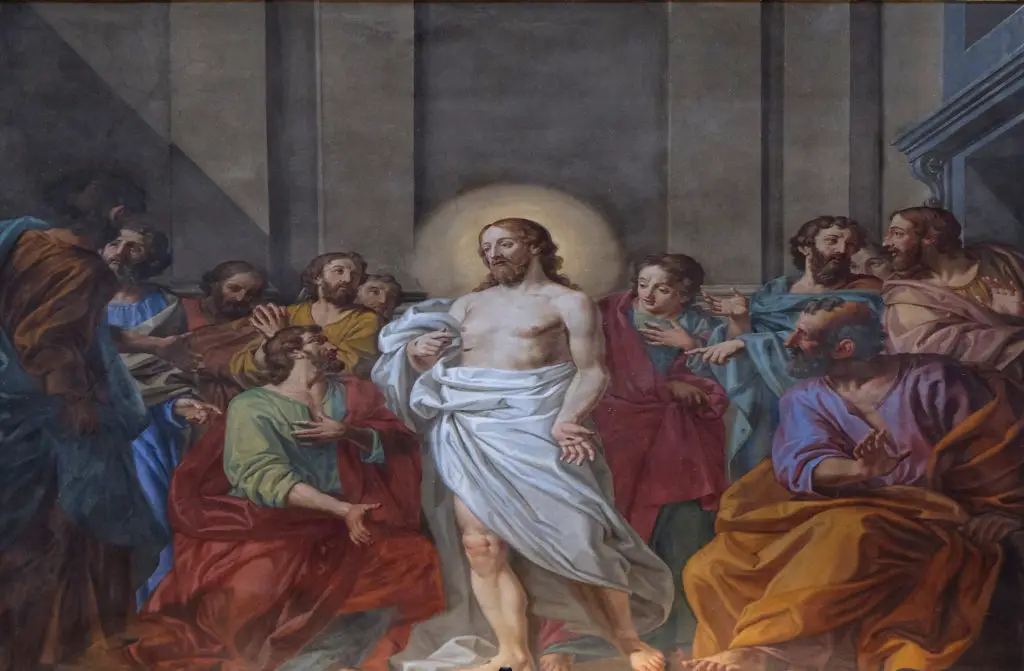
New Testament References:
Confession and penance through the Baptism of John the Baptist.
“For this is he that was spoken of by Isaias the prophet, saying: A voice of one crying in the desert, Prepare ye the way of the Lord, make straight his paths. And the same John had his garment of camel’s hair, and a leathern girdle about his loins: and his meat was locusts and wild honey. Then went out to him Jerusalem and all Judea, and all the country about Jordan: And were baptized by him in the Jordan, confessing their sins.And seeing many of the Pharisees and Sadducees coming to his baptism, he said to them: Ye brood of vipers, who hath shewed you to flee from the wrath to come? Bring forth therefore fruit worthy of penance. (St Matthew 3:6-8).
Jesus gives the Apostles authority to hear, forgive or retain sins.
“He said therefore to them again: Peace be to you. As the Father hath sent me, I also send
you. When he had said this, he breathed on them; and he said to them: Receive ye the Holy
Ghost. Whose sins you shall forgive, they are forgiven them: and whose sins you shall
retain, they are retained.” (St John 20: 22-23).
A continued tradition of those Baptised and receive the Holy Spirit from St Paul.
Disciples of Jesus are Baptised by St Paul and receive the Holy Spirit having only been baptized by the baptism of penance as administered by John the Baptist at Ephesus. These disciples begin to cast out demons and many who saw these great miracles came to believe and confessed their sins. (see Acts of the Apostles 19: 1-20)
“And many of them that believed came, confessing and declaring their deeds.”
(Acts 19: 18)
A fellowship of confessing sins and not being obstinate in sin.
“But if we walk in the light, as he also is in the light, we have fellowship one with another: And the blood of Jesus Christ his Son cleanseth us from all sin. If we say that we have no sin, we deceive ourselves and the truth is not in us. If we confess our sins, he is faithful and just, to forgive us our sins and to cleanse us from all iniquity. If we say that we have not sinned, we make him a liar: and his word is not in us.” (1 St John 1: 8-10).
Heaven rejoices when a sinner does penance.
“So I say to you, there shall be joy before the angels of God upon one sinner doing penance.” (St Luke 15:10).
The Parable of the Prodigal Son shows forgiveness and mercy.
This parable shows the repentant son, recognising his sin before God and his earthly father. He son goes and seeks forgiveness. The father shows him forgiveness without any conditions attached, ‘… this son was dead and is come to life again, was lost and is found. … (St Luke 15: 24). (For the full text see St Luke 15: 11-32).
Confessing sins to the Church, that being the Priests.
“And if he will not hear thee, take with thee one or two more: that in the mouth of two or three witnesses every word may stand. And if he will not hear them: tell the church. And if he will not hear the church, let him be to thee as the heathen and publican. Amen I say to you, whatsoever you shall bind upon earth, shall be bound also in heaven: and whatsoever you shall loose upon earth, shall be loosed also in heaven.” (St Matthew 18: 16-18).
St Matthew 16: 19: Jesus gives to St Peter the authority to bind and loose on earth.
“And I will give to thee the keys of the kingdom of heaven. And whatsoever thou shalt bind upon earth, it shall be bound also in heaven: and whatsoever thou shalt loose on earth, it shall be loosed also in heaven.” (St Matthew 16:19).
A continued tradition of the Early Church following the Ascension of Jesus and the coming of the Holy Spirit of Confessing of sins to others.
“Confess therefore your sins one to another: and pray one for another, that you may be saved. For the continual prayer of a just man availeth much. …. My brethren, if any of you err from the truth and one convert him: He must know that he who causeth a sinner to be converted from the error of his way shall save his soul from death and shall cover a multitude of sins.” (St James 5: 16, 19-20).
The above passages from scripture illustrate the practice of confessing one’s transgressions (sins) to others including priests; the recognition, acknowledgement, and admission of sins; praying and seeking God’s mercy; being penitent; and offering penance for the wrongdoing. All elements of the continued practice in the Roman Catholic Church that we see in the Church today and forms part of the deposit of faith.
Confession as a practice (Tradition) in the Church.
The recognition of different categories of sin was recognized by the Church from the late second century.
Baptism forgave all sins as we read in the Acts 2: 38, however what about the sins that were committed following Baptism?
An understanding of lesser sins we call venial sins was forgiven through the regular recitation of the Our Father (Pater Noster), more serious sins such as Mortal sins required to be heard by a Priest or a Bishop and required a public penance called exomologesis, a discipline of humiliation, prayer, and fasting before the whole church.
Private confession of minor sins to a priest followed by private penance became more accepted by the fourth and fifth centuries, and official authorization of this practice is often attributed to Pope Leo the Great (440–461).
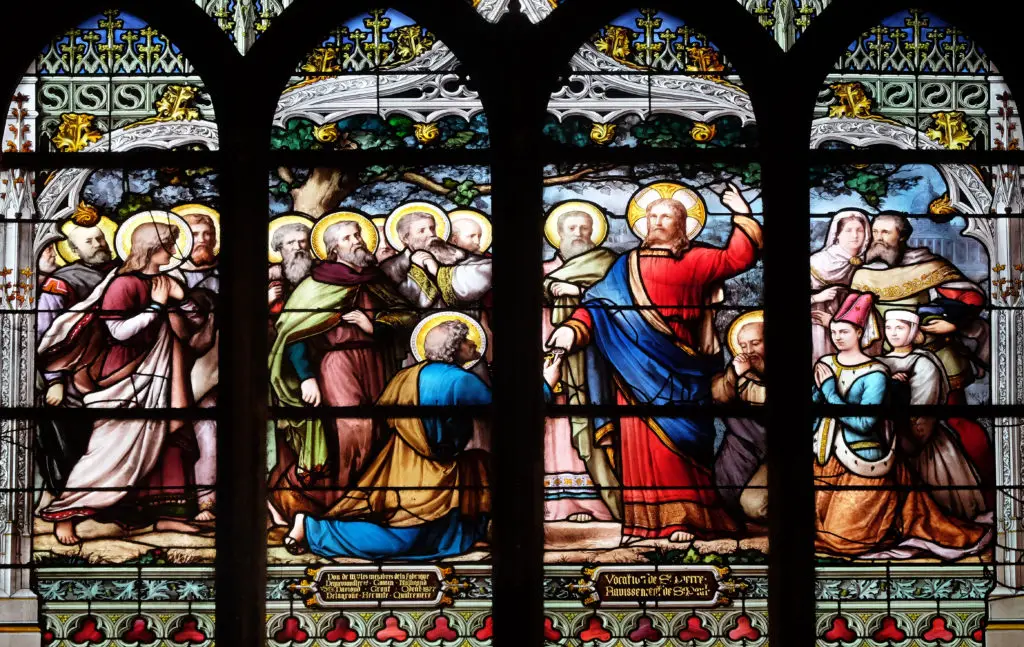
Was the Sacrament of Reconciliation instituted by Jesus Christ?
As an example of what would become the tradition practice and doctrine of the Church to institute the Sacrament of Reconciliation, Jesus Christ worked a miracle that would prove His authority to forgive sin.
In the following the passage, the Scribes challenge on the forgiveness of sins. Jesus responds.
“And when Jesus had seen their faith, he saith to the sick of the palsy: Son, thy sins are forgiven thee. And there were some of the scribes sitting there and thinking in their hearts:
Why doth this man speak thus? He blasphemeth. Who can forgive sins, but God only?
Which Jesus presently knowing in his spirit that they so thought within themselves, saith to them: Why think you these things in your hearts?
Which is easier, to say to the sick of the palsy:
Thy sins are forgiven thee; or to say: Arise, take up thy bed and walk?
But that you may know that the Son of man hath power on earth to forgive sins (he saith to the sick of the palsy):
I say to thee: Arise. Take up thy bed and go into thy house. And immediately he arose and, taking up his bed, went his way in the sight of all: so that all wondered and glorified God, saying: We never saw the like. (St Mark 2: 5-12).
Through His authority, Jesus has the authority to forgive sins, and He has (and gives) this authority to others i.e. St Peter and the Apostles and their successors, to do the same.
Jesus therefore instituted the Sacrament of Reconciliation. This is clear in the following quotes from Scripture:
“When he had said this, he breathed on them; and he said to them: Receive ye the Holy Ghost. Whose sins you shall forgive, they are forgiven them: and whose sins you shall retain, they are retained”. (St John 20: 22-23).
Again, in St Matthew, Peter is given the authority not only as head of the Church of Jesus (first Pope), but as the authority to bind or loose on earth:
“And I say to thee: That thou art Peter; and upon this rock I will build my church, and the gates of hell shall not prevail against it. And I will give to thee the keys of the kingdom of heaven. And whatsoever thou shalt bind upon earth, it shall be bound also in heaven: and whatsoever thou shalt loose on earth, it shall be loosed also in heaven.” (St Matthew 16: 18-19).
The Authority to forgive sins as handed down by Jesus to the Apostles consists of the following points:
- Power to forgive sins – wiping out the sin.
- Unlimited in number and seriousness.
- Power to make a judgement i.e. forgive or retain.
- Implies that sins are to be confessed.
- Heaven will respect i.e. loose or bind what St Peter and the Apostles do on earth.
The Sacrament of Reconciliation is a sign that gives Grace and has been the practice since the authority was handed to the Apostles from Jesus Christ. This wasn’t just for them but just as they received from Jesus, the Apostles passed on to their successors and this continues through the actions of the Church through the Priesthood as part of the Tradition of the Church.
What are the Matter and Form of the Sacrament of Reconciliation?
The Matter – these are all sins committed following one’s Baptism and are mortal in nature. These sins remove Grace from the soul and are called mortal for they are death to the soul. An example of a mortal sin is breaking any of the Ten Commandments, however one must fulfil the following for a sin to be classified as mortal:
- Be of grave matter.
- Be aware or conscious of the gravity of the sin.
- Consent to the sin wilfully.
NB: that there are mitigating factors that reduce the severity or culpability of a mortal sin for example coercion or ignorance (invincible or vincible) etc.
Also, the three acts of the penitent:
1. Contrition (perfect or imperfect).
This is the sorrow and detestation of sin that one shows for their sin, with the intention or resolution to avoid it in future. This arises in our Will and is fixed on the God whom we have offended. When we show this offence to the Creator, being God and are genuinely sorrow for our offence towards Him, we have Perfect Contrition. When our contrition arises from a fear of going to Hell, then this is known as Imperfect Contrition. The former contrition comes from a selfless love and the alter from a selfish love. However, both are valid.
It is interesting to note that a Perfect Contrition forgives sin even apart from the actual reception of a sacrament, though, of course, it implies some sort of intention of going to confession.
Imperfect contrition, on the contrary, forgives sin only when a sacrament is received, as when one goes to confession.
We should develop a habit of saying acts of perfect contrition.

2. Confession.
When confessing one’s sins we are required to confess both in their kind i.e.
“I stole money from a friend”, and the number of times the sin was committed.
Only unconfessed Mortal sins are required to be mentioned during the Sacrament of Reconciliation. However, venial sins that one is truly sorrow for, may also be mentioned.
Revealing our sins may at times be unpleasant, humbling and courageous, however if this means gaining Heaven when we die, it will be worth it.
3. Satisfaction.
The Penance handed to us from the Priest in the form of vocal prayer is to be carried out and fulfilled as soon as possible. It is good practice to pray your penance immediately following your confession.
If you have forgotten your penance, do not make one up yourself or ask someone else, mention it at the next confession
Penance has the power to abolish our temporal punishment for the sins committed.
The Form – these are the words of absolution uttered by the Priest:
“I absolve you of your sins, in the name of the Father, and of the Son, and of the Holy Spirit. Amen.”
How to make a valid and proper Confession?
Everything requires preparation and preparing for a valid and proper confession is no different.
There are several steps to take when readying ourselves for confession.
NB: It is a good habit to receive the Sacrament of Reconciliation as regular as possible. I would encourage every 1 to 2 weeks with a maximum of monthly. This keeps our sacramental life and awareness of our sins on the path to Jesus Christ. Confessing regularly allows us not to forget and keeps our conscience at peace with God and our neighbour.
Here are the ways to prepare for and to make a good confession:
Phase One: Preparation
Step One: Prepare by praying for the Grace and meditating on the evil effects of sin, such as hell, the loss of heaven, and the passion.
Step Two: Examine your conscience.
Step Three: If it helps, write down your sins i.e. kind and the number of times.
Step Four: Practice your Confession Privately.
Phase Two: Confessing
Step Five: Commence by saying:
“Bless me, father, for I have sinned. It has been _______________ (days/weeks/months/years) since my last confession and here are my sins:
NB: should this be your first confession, let the priest know or if you are nervous or cannot recall. The Priest will guide you through. I would recommend making an appointment and seeing the priest privately should this be the case.
Step Six: As part of step Five – mention how long it is since your last confession and tell your sins clearly, simply and humbly.
Step Seven: Finish off by saying:
“For these and all my sins, I am very sorry”
Step Eight: Listen attentively to the advice and penance given you.
Step Nine: Make an Act of Contrition loud enough to be heard by the priest when instructed by saying:
“O my God,
I am very sorry that I have sinned against you, because you are so good, and with your help, I will not sin again.”
Step Ten: The Priest will give the absolution.
Step Eleven: Thank the Priest.
Phase Three: Post- Confession
Step Twelve: Before leaving the church, say your penance. Thank God for the graces you have received.
As a recommendation, offer up your penance twice – once as instructed by the Priest and secondly offer the same penance for the Priest who just heard your confession.
What is the seal of confession?
The priest is obliged to keep secret the sins that he hears in the confessional regardless of circumstances, even should he be threatened with his life.
The Confessional is protected by this seal or face excommunication.
There has not been one recorded violation of this seal in the history of the Church.
What is the importance of the Sacrament of Reconciliation?
The Sacrament of Reconciliation is of tremendous importance and value to the individual. It was designed by our Lord for all.
The following benefits flow from the Sacrament of Reconciliation:
- Grace is received into the soul.
- Assist the penitent and now reconciled to avoid sin in the future.
- Through the given Penance, temporal punishment is done away with.
- Provides the individual with peace of mind.
- Seeks reconciliation with the Creator – God, to whom one is answerable.
- Should the person die, they are prepared to meet God and may enter into the Beatific Vision.
- Improves the moral life of the individual, family and community.
- Spiritual, social, psychological, behavioural and physical wellbeing.
The overall benefit of the Sacrament of Reconciliation is to fulfill the reason why God created – to Know, Love and Serve God. To be Happy with Him in Heaven.
God be with you.

